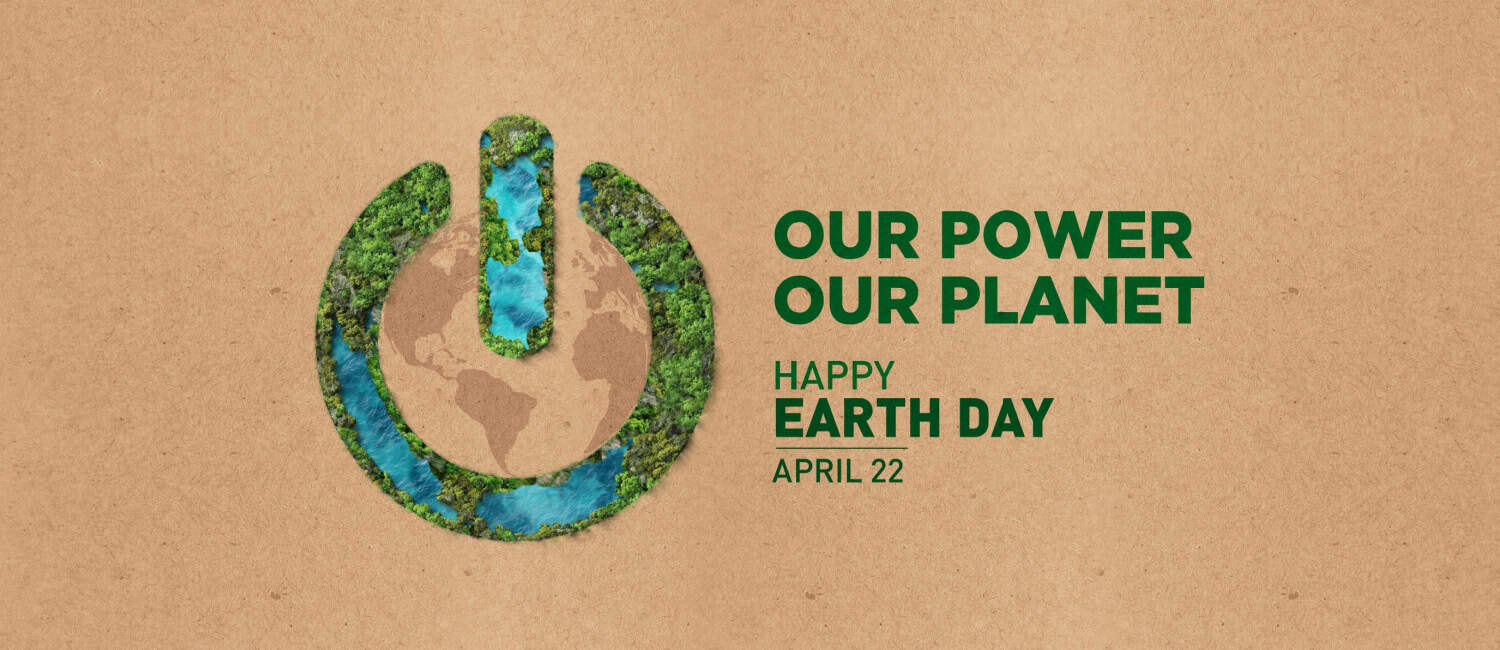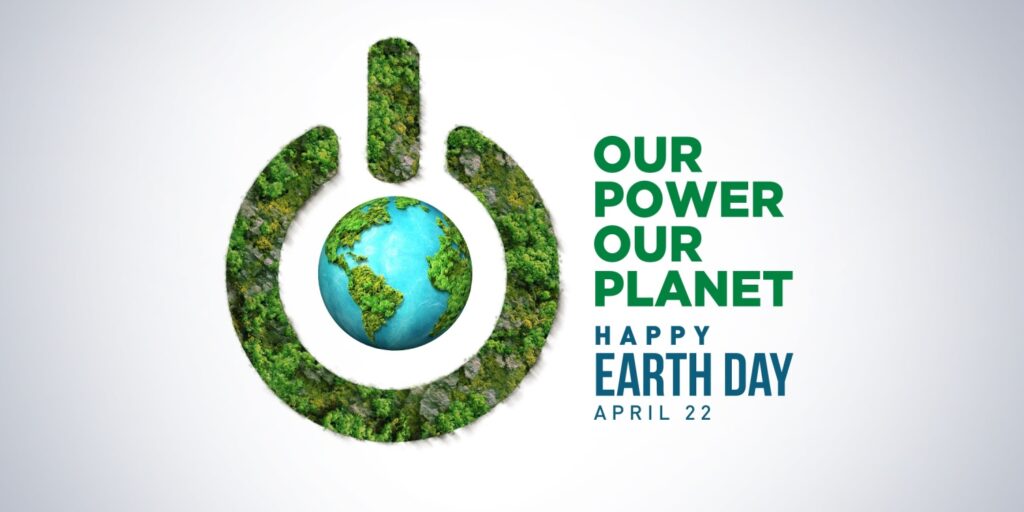On 22 April 2025, Earth Day will mark its 55th anniversary—a significant milestone in the ongoing global environmental protection and sustainability movement. Since its inception in 1970, Earth Day has served as a powerful reminder that collective action can lead to real, lasting change. What began as a grassroots initiative in the United States has grown into a worldwide campaign, mobilising over one billion people each year across more than 190 countries. It has inspired policies, sparked innovation, and empowered communities to take action for the planet.
This year’s theme, Our Power, Our Planet, underscores the growing influence and responsibility of businesses in shaping a sustainable future. It’s a call to harness the collective power of industries, organisations, and individuals to accelerate meaningful climate action—not just through advocacy, but through measurable, strategic change in how we operate and grow.
For companies of all sizes, Earth Day 2025 is more than just a symbolic occasion—it’s a pivotal opportunity to align corporate strategies with global environmental goals. Integrating sustainability into your core business practices not only helps protect the planet but also drives long-term resilience, enhances brand reputation, and meets the evolving expectations of customers, investors, and employees alike.
As we celebrate over five decades of environmental progress, Earth Day reminds us that the health of our planet is a shared responsibility—and a shared opportunity. Supporting Earth Day within your corporate strategy isn’t just good ethics; it’s good business.
Key Takeaways
-
Earth Day is a powerful reminder that sustainability and business success go hand in hand. It’s an opportunity for companies to reflect on their environmental impact and align their goals with the broader movement for a healthier planet.
-
Environmental responsibility is becoming a business imperative. Consumers and employees are increasingly drawn to brands that demonstrate a genuine commitment to sustainability, transparency, and ethical practices.
-
Sustainable practices aren’t just good for the planet—they’re smart business. From improving operational efficiency to driving innovation and long-term profitability, investing in sustainability can unlock significant value across your organisation.
A Movement Begins: The Origins of Earth Day
Earth Day was born out of growing public concern for the environment in the late 1960s, a time marked by visible pollution, oil spills, smog, and widespread ecological damage. In 1970, student activist Denis Hayes channeled this concern into action by organising a series of campus teach-ins aimed at raising awareness and sparking dialogue about environmental issues. What began as a modest grassroots initiative rapidly gained momentum, culminating in the first Earth Day on 22 April 1970.
That day, over 20 million Americans—from students and teachers to families and local leaders—took to the streets, parks, and auditoriums to demand change. They brought national attention to critical issues such as oil spills, toxic waste dumping, pesticide overuse, deforestation, and the destruction of wildlife habitats. It was a moment of collective awakening that spotlighted the urgent need to protect our planet—and proved that public pressure could drive real change.
The first Earth Day ignited the modern environmental movement and paved the way for landmark legislation, including the Clean Air Act, Clean Water Act, and the creation of the U.S. Environmental Protection Agency. More than five decades later, Earth Day remains a powerful platform for advocacy, education, and environmental policy around the world. It continues to unite people across borders and industries in a shared commitment to building a more sustainable, just future for all.
What is Earth Day, and why should businesses care?
Earth Day is an annual global celebration and a not-for-profit organisation that raises awareness of environmental preservation and celebrates the achievements of this environmental movement. It’s also a yearly reminder of the importance of sustainability, calling upon individuals, communities, and businesses to preserve our planet for future generations.
For businesses, Earth Day represents more than a one-day celebration; it’s an opportunity to align with the growing global movement toward sustainability. By supporting Earth Day and adopting sustainable practices, businesses play a key role in helping mitigate the climate crisis while enjoying commercial benefits.
As noted by Earth Day, changing global perspectives means it’s no longer a choice between going green and long-term profitability – businesses of all sizes must act now.
What does ‘Our Power, Our Planet’ mean?
The theme for Earth Day 2025, “Our Power, Our Planet”, is a call to action for large and small businesses to recognise their influence in shaping a sustainable future. The theme highlights our collective power in addressing climate change, conserving resources, and building a greener economy. It emphasises the need for businesses to take responsibility for their environmental impact and act in ways that benefit the planet and their bottom line.
As Kathleen Rogers, President of EARTHDAY.ORG, says:
This Earth Day, communities worldwide will be holding vital conversations about renewable energy implementation, not only as an essential lever in addressing climate change but also as a key step towards a resilient and prosperous future.
By adopting sustainable business practices, companies can contribute to environmental improvements. What’s more, they can position themselves as leaders in the global drive for change.
Why Earth Day is important for business owners
Businesses with strong environmental, social, and governance (ESG) agendas are helping combat climate change while reaping financial and operational benefits. For example, it strengthens the brand’s reputation and attracts consumers and top talent.
- 10 ways to reduce your business energy bills
- Working from home – sustainability guidance
- Introduction to corporate social responsibility
Here are five reasons why business owners should embrace sustainability on Earth Day and beyond this date:
1. Enhances brand reputation and attracts conscious consumers
Consumers are increasingly aligning their purchasing decisions with their values.
A 2025 report from The Round Up has revealed that 78% of consumers consider sustainability an important factor in their purchasing decisions, while 55% are willing to pay more for eco-friendly brands. This trend will only intensify as Millennials and Gen Z gain more purchasing power.
By prioritising sustainability, businesses can enhance their brand image and increase consumer loyalty.

2. Boosts profitability and efficiency
Sustainability isn’t just about environmental responsibility – it’s a sensible move for your business. Energy-saving technologies, waste reduction, and resource efficiency can significantly reduce costs.
Take FedEx as an example. It aims for its entire parcel pickup and delivery (PUD) fleet to be made up of zero-emission electric vehicles by 2040. So far, FedEx Express Europe is saving up to 11.2 tonnes of carbon dioxide per vehicle annually by switching diesel vans to Mercedes-Benz eSprinters.
3. Improves employee retention and satisfaction
Sustainable companies are more attractive to top talent, particularly among Millennials and Gen Z. These groups comprise the largest global workforce segment.
According to Deloitte’s 2024 Gen Z and Millennial Survey, environmental concerns are directly influencing career decisions. One in five Gen Zs (20%) and nearly as many millennials (19%) have already changed jobs or even shifted industries due to sustainability-related issues. Looking ahead, an additional 25% of both groups say they plan to make similar moves in the future—highlighting the growing importance of environmental values in attracting and retaining top talent.
A strong commitment to sustainability can boost employee morale and retention while attracting skilled professionals who value ethical business practices.
4. Helps prepare your business for future regulations
As the climate crisis intensifies, governments around the world are introducing stricter environmental regulations—from emissions caps and carbon taxes to mandatory reporting and supply chain transparency. For businesses, this signals a clear shift: sustainability is no longer optional, it’s becoming a regulatory requirement.
Companies that proactively adopt sustainable practices will be far better positioned to meet these new standards, avoid non-compliance penalties, and reduce legal and financial risks. But beyond compliance, early action offers a significant competitive advantage.

By integrating green policies ahead of the curve, businesses can future-proof their operations, improve operational efficiency, and build resilience against market volatility and resource scarcity. Sustainability-driven companies are also more likely to attract investors, customers, and talent who value environmental responsibility—ultimately strengthening brand reputation and long-term profitability.
In short, sustainability isn’t just about meeting regulations—it’s about leading the way in a changing world.
How to celebrate Earth Day at work
Earth Day is an excellent opportunity for your business to showcase its commitment to sustainability through meaningful activities. It’s not about Earth Day as a one-day event but about long-term actions to reduce your business’ environmental impact.
Here are some actionable ways to celebrate Earth Day at work and show your commitment to sustainability:
- Hold an Earth Day event: Host workshops, speaker sessions, or green challenges that engage employees and raise awareness.
- Reduce your office waste: Launch a recycling programme on Earth Day or introduce a ban on single-use plastics in your workplace.
- Encourage sustainable commuting: Provide incentives for employees to bike, carpool, or use public transportation to reduce their carbon footprint on Earth Day – and ideally beyond.
Long-term sustainability efforts for your business
After the Earth Day celebration, consider integrating sustainability into your long-term business strategy. Here are a few ways you can ensure your company remains committed to sustainable practices all year long:
- Use energy-saving technologies: From smart thermostats to energy-efficient lighting and HVAC systems, plenty of technologies can reduce your business’ energy consumption and lower utility bills.
- Work towards zero waste: Develop strategies for reducing waste, such as ordering lunches with minimal or no packaging, having recycling and food-waste bins, or exploring plastic-free delivery or refill services for hygiene products.
- Aim for environmental accreditation: Show your customers and employees that your business is committed to sustainability by aiming for certifications such as B Corp. These credentials validate your efforts and help distinguish your brand as an environmentally responsible leader.
The B Impact Assessment (BIA) is a free online tool used by over 150,000 businesses to help them measure, monitor, and improve their environmental impact. Additionally, Green Mark provides a step-by-step approach to businesses looking to develop a fully documented Environmental Management System (EMS).
How 1st Formations is celebrating Earth Day
At 1st Formations, Earth Day offers more than a moment of reflection—it’s a meaningful opportunity to celebrate the progress we’ve made on our sustainability journey and reaffirm our commitment to continuous improvement.
We’re proud to be a certified carbon-neutral business, a milestone that reflects our dedication to measuring, managing, and offsetting our carbon footprint. But we know that achieving carbon neutrality is just one step on a much longer path.
That’s why we’ve gone further by implementing a comprehensive Carbon Reduction Plan (CRP)—a strategic roadmap designed to lower our emissions across all areas of our operations. From embracing energy-efficient technologies and reducing waste to promoting greener practices among our employees and suppliers, our CRP is focused on delivering measurable, lasting impact.
Sustainability isn’t just a goal—it’s an ongoing responsibility. As we continue to grow, we’re committed to integrating environmentally responsible practices into every part of our business and helping shape a more sustainable future for the communities and customers we serve.
Start your business’ sustainability journey today
As Earth Day approaches its 55th anniversary, it’s clear businesses have the power to make a difference. Why not start contributing to a greener future for your business and the planet today? Consider adopting sustainable practices, celebrating Earth Day, and committing to long-term environmental improvements.
Join the global movement today and explore the 1st Formations blog for more insights and strategies to drive positive change. Don’t forget to leave a comment with questions or ideas for celebrating Earth Day.
Please note that the information provided in this article is for general informational purposes only and does not constitute legal, tax, or professional advice. While our aim is that the content is accurate and up to date, it should not be relied upon as a substitute for tailored advice from qualified professionals. We strongly recommend that you seek independent legal and tax advice specific to your circumstances before acting on any information contained in this article. We accept no responsibility or liability for any loss or damage that may result from your reliance on the information provided in this article. Use of the information contained in this article is entirely at your own risk.










Join The Discussion